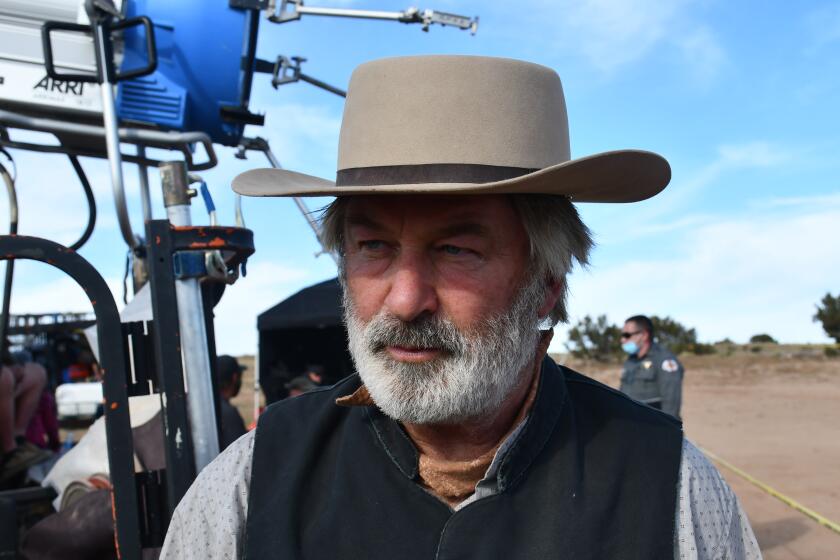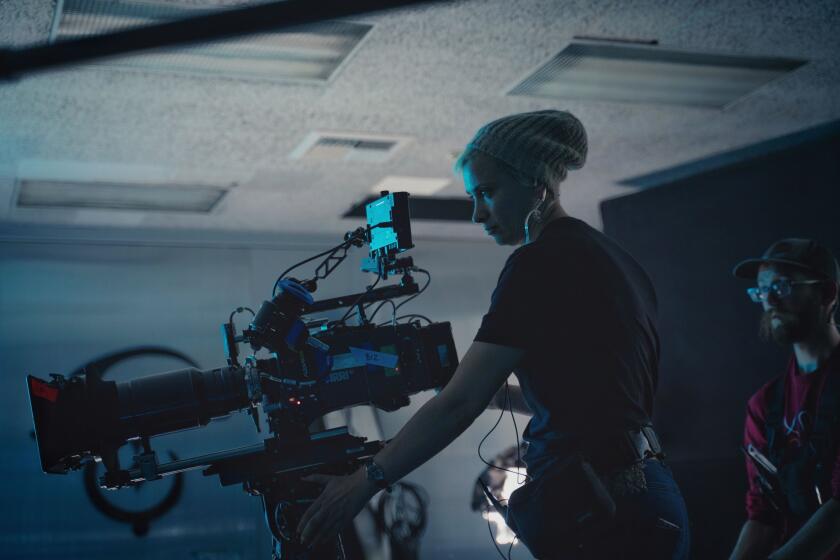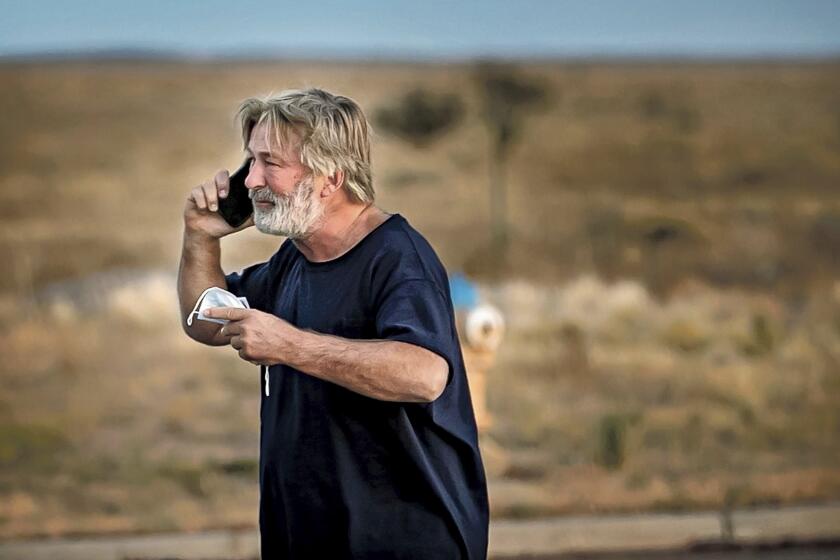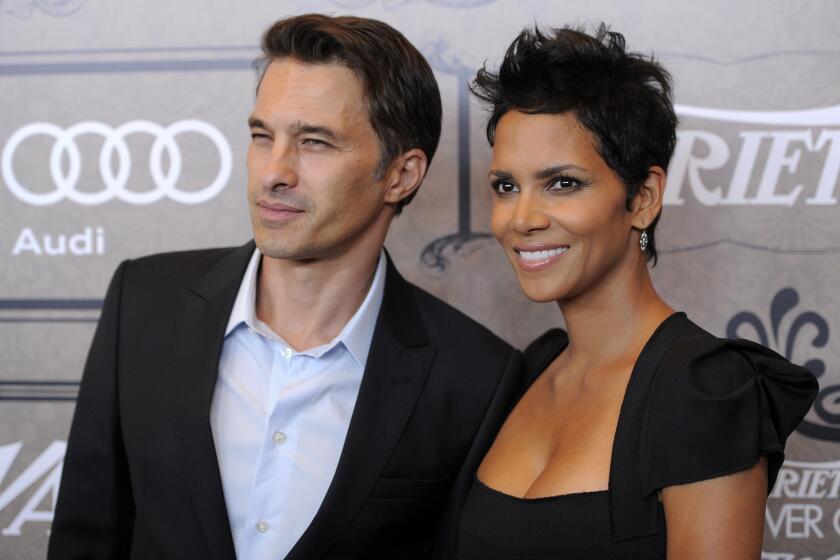Alec Baldwin is credited as a producer on ‘Rust.’ What does that really mean?

Being a film producer can mean different things to different people. And when a star like Alec Baldwin takes a producer credit on a film, it can signal a variety of levels of involvement in the project itself.
While a film producer performs many tasks through the life of a film — from its inception and development, financing and production, all the way to after its premiere and release — the specific duties that Baldwin may have taken on for the Western drama “Rust” have become a subject of increased scrutiny.
In addition to playing the lead role, Baldwin is also a producer on “Rust,” the movie production that resulted in the death of cinematographer Halyna Hutchins when a gun in Baldwin’s hand that was believed to be unloaded went off during a rehearsal.
More than a year after “Rust” cinematographer Halyna Hutchins was fatally shot on the film’s set near Santa Fe, star-producer Alec Baldwin and the movie’s armorer are being charged in her death.
Leading up to the incident, there had been unrest among the crew, with several union camera people walking off, only to be replaced by nonunion workers. An inexperienced armorer may not have properly handled and checked the fatal weapon prior to the scene, and there had already been incidents with guns in the days prior.
The production of “Rust” was a thicket of numerous production companies and multiple financiers, which isn’t unusual for an independent production of its scale, but it leads to various people sharing the titles of executive producer or producer without much clarity to outside observers regarding just who is responsible for what.
From a copy of the day’s call sheet obtained by The Times, the producers on the project besides Baldwin were Matt DelPiano — who is Baldwin’s manager and a former CAA agent — Ryan Smith, Anjul Nigam, Nathan Klingher and Ryan Winterstern. The film also had four executive producers.
Cinematographer Halyna Hutchins was killed on the set of “Rust” in October 2021. A judge dismissed the involuntary manslaughter case against star Alec Baldwin in July 2024.
Sometimes the credit is simply a vanity title to boost an actor’s sense of involvement in a project. Sometimes it is a way to defer upfront fees to a performer in favor of back-end payments. And sometimes an actor is so deeply involved with a project that the credit is a way to make official their added influence along the way.
Distinctions between an executive producer and a producer credit also come into play in determining awards eligibility and who among a producing team potentially gets to take home a statue. Only producers are eligible for Oscar nominations, not executive producers. Meanwhile, in television, executive producer is often the more “hands-on” credit, including for showrunners. All of which can dilute the true meaning of the title.
“This ‘Rust’ situation opens up the whole discussion about what a producer is and who the buck stops with really. Who is responsible for Halyna’s death?” said Mynette Louie, Independent Spirit Award-winning producer of films such as “Swallow” and “I Carry You With Me.” “When you have a bunch of executives and managers and actors and people who aren’t really producers in a hands-on way, where you’re seeing to the cast and crew and the safety and the liability of the production, then who does the buck stop with?”
“There generally is not a way to unravel it when you’re sitting outside of that production,” said Travis Knox, associate professor of producing at Chapman University, on who exactly is a lead producer on set. “You just don’t know.”
Before the revolver fired, Alec Baldwin was rehearsing how to point it toward the camera, says an affidavit laying out new details of the shooting.
On a copy of the “Rust” screenplay obtained by The Times, Baldwin shares a story credit with the film’s director, Joel Souza, which does point to a higher level of involvement in the project’s creative development. He also had a producing credit on Souza’s previous film, 2019’s “Crown Vic,” in which Baldwin did not appear as an actor.
A few days before the accident, Baldwin posted a video online expressing support for IATSE members who were threatening to strike in part over issues of on-set safety. Yet as trouble brewed on the set of “Rust” leading up to Hutchins’ death, it is not clear how aware Baldwin was of the dysfunction on the production or what role he might have played in addressing any problems.
“It’s so malleable,” said a producer who has worked with actor-producers in the past and declined to be identified due to the sensitive nature of the subject. “He could just step back and say, ‘I don’t know what you’re talking about, I’m acting in this,’ even though, in name, he’s a producer. Or he could feel a lot of responsibility. It just all depends on who the actor is.”
Two people on a film set who both have the title of producer may nevertheless perform different functions on the production, from finding and developing the material to hiring the crew. Tom Nunan, continuing lecturer at the UCLA School of Theater, Film and Television and an executive producer on the Oscar-winning “Crash,” likened the distinction between more creative producing work and that of physical production to the difference between an architect and a contractor working on a building.
“I don’t think on the ground there was any confusion about who’s in charge of what. I believe that, on most sets, it’s very clear,” said Nunan. “Even though in the credits there might be an awful lot of EPs and producers on this, on the ground when something’s being produced, it’s very clear what the hierarchy is.”
The Producers Guild of America has attempted to clarify some of the confusion with the PGA certification mark. When “p.g.a.” appears after someone’s name in a film’s credits, the licensed mark notes that the producer’s work on that film met the requirements of performing the major producing functions on the project. The certification mark does not denote membership in the organization, and it may only be used following a determination by the PGA.
Legal experts weigh in on whether crew and producers of “Rust” could face civil or criminal liability in the death of cinematographer Halyna Hutchins.
Among Baldwin’s earliest producing credits were an executive producer credit on “State and Main,” David Mamet’s 2000 satire about a movie production that overruns a small New England town. Baldwin was also credited as a producer on “30 Rock,” the long-running NBC sitcom for which he won multiple Emmys for his role as a scheming corporate executive.
Baldwin starred in the 2016 film “Blind,” and, according to Jennifer Gelfer, who was lead producer on the project, Baldwin received an executive producer credit on the film as part of his deal as an actor but served no other producorial role. However, he was still very much a leader on the set, even bringing in his own stunt coordinator for a few scenes when the budget was tight.
“In terms of being careful and making sure everybody was taken care of, Alec, just as an actor, was always caring about that,” said Gelfer.
The dual role of star and producer on “Rust” may have given Baldwin a sense of additional challenges and responsibilities on the set.
“You are always aware of what’s going on all around you,” Nunan said. “Believe me, he was aware of all of the pressures and the stress of the production going on while he was also mastering whatever scene he had to act in on the day. You never, ever are able to shed that hat, even if you wanted to.”
Leading up to the accident that took Hutchins’ life, there were numerous warning signs that “Rust” was a production heading toward disaster. Whether there were producers on set actually capable of handling those issues may be a central question in determining exactly what went wrong and when, and it will surely come into play in the various investigations underway.
“More than anything, it actually is the producer’s job to know what’s going on on your set,” said the producer who asked not to be named, “and if there’s problems, you have to deal with it right away. And it seems like there were these problems, and either these people weren’t experienced enough to know there was a problem or they didn’t care or didn’t have enough money. It just sounds really screwed up.”
More to Read
Only good movies
Get the Indie Focus newsletter, Mark Olsen's weekly guide to the world of cinema.
You may occasionally receive promotional content from the Los Angeles Times.















